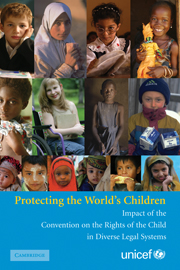 Protecting the World's Children
Protecting the World's Children Book contents
- Frontmatter
- Contents
- Acknowledgements
- Foreword
- Contributors
- Introduction and Overview
- 1 A Comparative Study of the Impact of the Convention on the Rights of the Child: Law Reform in Selected Common Law Countries
- 2 A Comparative Study of the Impact of the Convention on the Rights of the Child: Law Reform in Selected Civil Law Countries
- 3 A Comparative Perspective of the Convention on the Rights of the Child and the Principles of Islamic Law: Law Reform and Children's Rights in Muslim Jurisdictions
- 4 Law Reform and Children's Rights in Plural Legal Systems: Some Experiences in Sub-Saharan Africa
- Index
- References
3 - A Comparative Perspective of the Convention on the Rights of the Child and the Principles of Islamic Law: Law Reform and Children's Rights in Muslim Jurisdictions
Published online by Cambridge University Press: 30 October 2009
- Frontmatter
- Contents
- Acknowledgements
- Foreword
- Contributors
- Introduction and Overview
- 1 A Comparative Study of the Impact of the Convention on the Rights of the Child: Law Reform in Selected Common Law Countries
- 2 A Comparative Study of the Impact of the Convention on the Rights of the Child: Law Reform in Selected Civil Law Countries
- 3 A Comparative Perspective of the Convention on the Rights of the Child and the Principles of Islamic Law: Law Reform and Children's Rights in Muslim Jurisdictions
- 4 Law Reform and Children's Rights in Plural Legal Systems: Some Experiences in Sub-Saharan Africa
- Index
- References
Summary
INTRODUCTION
This chapter evaluates the impact of the United Nations Convention on Rights of the Child (CRC) in a selection of Muslim States parties. It will comment on legislative reform initiatives (in addition to existing legal frameworks, statutory provisions and institutional mechanisms) undertaken in Jordan, Mauritania and Morocco affecting child rights, highlighting compatibility or otherwise with substantive provisions of the CRC. Arguing from a socio-legal and law-in-context approach, the chapter will propose a framework for enhanced convergence of the Islamic legal tradition and the CRC to create an enabling environment for child rights in these jurisdictions.
THE CONTEXT FOR LEGAL REFORM ON CHILD RIGHTS IN MUSLIM JURISDICTIONS: PAST AND PRESENT
An overview of the status of human rights treaties, including the Convention on the Elimination of All Forms of Discrimination against Women (CEDAW) and the CRC, presents an interesting pattern of ratification and reservations. Although many countries have ratified with reservations, Muslim countries are unique in the fact that they have specifically identified the Islamic religion and Islamic law as justification for many of these reservations. It is therefore pertinent to initiate the discussion of implementation of the CRC in Muslim jurisdictions by presenting an overview of the conceptual foundations of human rights and child rights in Islam, which to a large extent informs the legal system in Muslim countries.
- Type
- Chapter
- Information
- Protecting the World's ChildrenImpact of the Convention on the Rights of the Child in Diverse Legal Systems, pp. 142 - 208Publisher: Cambridge University PressPrint publication year: 2007


